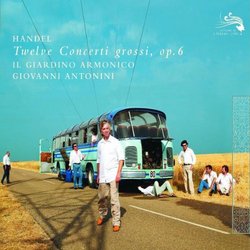Designed to Tick People Off?
M. Figg | USA | 12/28/2009
(4 out of 5 stars)
"The liner notes for this new recording of Handel's Opus 6 Concerti Grossi (works for string orchestra with solo sections by a small group) discuss Il Giardino Armonico's project to reclaim Handel's Italian roots, and the group's mission is immediately heard in the music. Their highly theatrical/vocal approach to the music borders just short of exaggeration, and will no doubt pester listeners who expect the calm, stately approach usually associated with this music. Not to say that Il Giardino Armonico is unable to display these qualities, it's just obviously NOT their top aesthetic priority in interpreting these works! What does come across consistently throughout the disc is rhythmic intensity, bright/transparent orchestral textures and an overriding sense that they are "pushing" the music and themselves, never allowing things to proceed simply on the inertia of Handel's catchy melodies or sturdy counterpoint. For me, this was welcome: the music never comes across as overly refined (read, stereotypically "English") and their interpretation is never academic or antiseptic (read, stereotypically "period instrument"). The strong attacks, busy continuo and close recording might put off fans of the more refined side of this music, and there are times I did get the feeling that Il Giardino Armonico was applying effects just to shake things up (the 'Polonoise' of Concerto 3 was a bit grating), but for me these were infrequent, small complaints: listening to this recording I honestly did feel like I was hearing some old in a new light. Also ear-catching was the group's decision to include the oboe parts that Handel later added for a few of these concertos, as well as the alternation of instruments in the continuo (rhythm section). Fans of a more conservative approach might try Andrew Manze conducting the Academy of Ancient Music (though I found their tempos to be too measured and their sound a little too dry and proper). An out of print disc of William Christie and Les Arts Florisants playing excerpts from Opus 6 has a beautiful sound, exciting tempos, those wonderful oboe parts and some invigorating embellishment from the soloists, but this disc immediately became my top choice for a beautiful, exciting (albeit unique!) rendition of these works.
"
A Noble Experiment that Failed
Sheldon Lichter | Eugene, OR | 02/11/2010
(3 out of 5 stars)
"I found these performances generally to be quite unpleasant listening. It is easy to tell that these are musicians of the highest order: They play, in terms of skill and feeling, wonderfully. But the way they have chosen to play, to make Handel sound like an Italian composer of the era, is wrongheaded at least, and might even be described, with less kindness, as perverse.
The fact that Handel spent time, in his youth, studying in Italy; and that he wrote so many operas in Italian -- do not make him an Italian composer. The attempt, as it seems to me, to force him to sound like a Vivaldi wannabe, simply backfires for me. It is full of forced and mannered accents, now loud, raw, and harsh; now gentle, low, and sweet -- all alternating without rhyme or reason -- and pretty much without musical-energetic merit. The influence of beautifully singing Italianate melody, during Handel's early education, was quite sufficient to nurture his art...in the opinion of a non-musician.
But, I would give the results three stars anyway for the excellence of the musicians as players. Unfortunately, I can recommend this recording only as a kind of lark, and an exploration into the unusual. But as one who loves so much of Handel, and frankly, so little of the "authentic instrument" movement, I see no way to brighten my judgment of the matter.
Was it the conductor who put them up to it or was the "experiment" done this way by mutual consent? I have no idea. But the results, I regret writing, speak for themselves."

